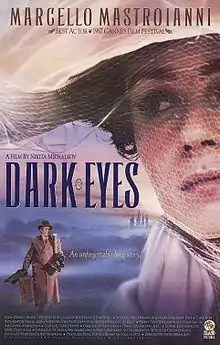| Dark Eyes | |
|---|---|
 Film poster | |
| Directed by | Nikita Mikhalkov |
| Written by | Alexander Adabashyan Nikita Mikhalkov Suso Cecchi d'Amico Anton Chekhov (stories) |
| Produced by | Carlo Cucchi Silvia D'Amico Bendico |
| Starring | Marcello Mastroianni Marthe Keller Yelena Safonova Pina Cei Vsevolod Larionov Innokenti Smoktunovsky |
| Cinematography | Franco Di Giacomo |
| Edited by | Enzo Meniconi |
| Music by | Francis Lai |
| Distributed by | RUSCICO |
Release date | 9 September 1987 |
Running time | 118 minutes |
| Countries | Italy Soviet Union |
| Language | Italian / Russian / French |
Dark Eyes (Italian: Oci ciornie; Russian: Очи чёрные; Russian pronunciation: [ˈo:t͡ɕɪ ˈt͡ɕɵ:rnɨjə]) is a 1987 Italian and Soviet film. Set in Italy and Russia in the years before the First World War, it tells the story of a married Italian man who falls in love with a married Russian woman. Starring Marcello Mastroianni and Yelena Safonova,[1] it received positive reviews from critics.
Plot
At a table in the empty restaurant of an Italian ship, Romano is sitting drinking. Pavel, a middle-aged Russian on his honeymoon cruise, enters and the two men strike up a conversation. When Romano says he once went to Russia because of a woman, Pavel asks to hear his story.
From a poor family, he qualified as an architect and married a rich woman who inherited a bank. With little to do, on pretence of illness he took a holiday on his own at an expensive spa. There he met Anna, a Russian woman on her own, who told him she was from a poor family and married a rich man for security. After one night together, she left Romano a letter and disappeared back to Russia.
Deciding that he wanted to spend the rest of his life with her, on pretence of exploring business opportunities he travelled to her remote town. While her husband was hosting a reception for the distinguished foreigner, Romano pursued Anna around the outbuildings and caught her in the henhouse. He said, if she promised to wait for him, he would come back to claim her.
Rushing back to Italy, he found that his wife's bank had collapsed and bailiffs were stripping their palatial house, which was up for sale. Holding the letter she had found, she asked if he had a woman in Russia. He said no, and the two were reconciled. Later she inherited an unexpected legacy and was able to resume their opulent lifestyle.
Pavel says his wife had left an unhappy marriage in the provinces and it took a long time to convince her to trust him and marry again. At this point, the ship's cook comes in and curtly orders Romano to lay the tables for lunch. Pavel goes to look for his wife, who is Anna.
Source material
The film was inspired by four of Anton Chekhov's stories, notably The Lady with the Dog. It was adapted by a Soviet-Italian team that included Alexander Adabashyan, Suso Cecchi d'Amico and Nikita Mikhalkov. Mikhalkov also directed the film. The title refers to a famous Russian song.
Cast
- Marcello Mastroianni as Romano Patroni
- Silvana Mangano as Elisa, Romano's wife
- Marthe Keller as Tina, Romano's mistress
- Isabella Rossellini as Claudia, Romano's daughter
- Pina Cei as Elisa's mother
- Yelena Safonova as Anna Sergeyevna, the Governor's wife
- Innokenti Smoktunovsky as the Governor of Sysoyev
- Vsevolod Larionov as Pavel Alekseev
- Ari Ramirez
Location
Principal shooting took place at the Montecatini Terme in Tuscany, in the Volga town of Kostroma, and in Leningrad (Vladimir Palace, Peter and Paul Fortress).
Reception
Critical response
Dark Eyes has an approval rating of 100% on review aggregator website Rotten Tomatoes, based on 9 reviews, and an average rating of 7.84/10.[2]
Awards
Mastroianni received the award for Best Actor at the 1987 Cannes Film Festival[3] and was nominated for the Academy Award for Best Actor. Safonova was awarded the David di Donatello as Best Actress. Costume Designer Carlo Diappi was awarded the Ciak d'oro.[4]
See also
References
- ↑ "NY Times: Dark Eyes". Movies & TV Dept. The New York Times. 2010. Archived from the original on 2010-04-03. Retrieved 2009-04-01.
- ↑ "Dark Eyes (1987)". Rotten Tomatoes.
- ↑ "Festival de Cannes: Dark Eyes". festival-cannes.com. Retrieved 2009-07-19.
- ↑ "Ciak d'Oro 2018: tutti i premi - Ciak Magazine". www.ciakmagazine.it. Archived from the original on 2018-06-10.